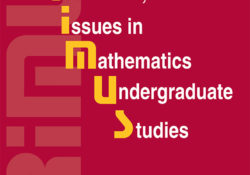tandfonline.com har udgivet en rapport under søgningen “Teacher Education Mathematics”: Abstract This editorial serves as an introduction to the Special Issue on Implementing Mastery Grading in the Undergraduate Mathematics Classroom. We provide a broad introduction to mastery grading and describe articles in this special issue that provide a wide range of implementations of mastery grading in a variety of undergraduate mathematics classrooms. We conclude by identifying additional resources available to new practitioners, and describing ideas for future work related to mastery grading. We hope this special issue will serve as a resource for both experienced practitioners and those who wish to begin using mastery grading. Link til kilde
Like this:
Like Loading...
eric.ed.gov har udgivet: Mathematics anxiety is a prevalent problem in many K-12 classrooms, and if not appropriately addressed can cause lasting educational harm to students as they enter adulthood. Researchers suggest that the finality of traditional grades has increased mathematics anxiety in today’s classrooms. The extreme weight of grades, such as determining participation in school events, scholarship awards, and further education opportunities is a significant contributing factor to the increased heightened stress. The purpose of this literature review is to address one factor that can decrease mathematics anxiety, the use of standards-based grading, which shows mastery or progress towards mastery on individual standards. The beginning of this review will provide an overview of factors that lead to mathematics anxiety, then move into a discussion about the differences between traditional grading… Continue Reading →
Like this:
Like Loading...
tandfonline.com har udgivet en rapport under søgningen “Teacher Education Mathematics”: Link til kilde
Like this:
Like Loading...
eric.ed.gov har udgivet: We know from previous survey research that teachers who hold high expectations for all of their students significantly increase the odds that those young people will go on to complete high school and college. One indicator of teachers’ expectations is their approach to grading–specifically, whether they subject students to more or less rigorous grading practices. Unfortunately, “grade inflation” is pervasive in U.S. high schools, as evidenced by rising GPAs even as SAT scores and other measures of academic performance have held stable or fallen. The result is that a “good” grade is no longer a clear marker of knowledge and skills. Authored by American University’s Seth Gershenson, “Great Expectations: The Impact of Rigorous Grading Practices on Student Achievement” examines to what extent teachers’ grading standards affect student… Continue Reading →
Like this:
Like Loading...
eric.ed.gov har udgivet: The development of computer science, statistics and other technological fields, give us more opportunities to improve the process of evaluation of degree of knowledge and achievements in a learning process of our students. More and more we are relying on the computer software to guide us in the grading process. An improved way of grading can help overcome some limitations of the educational process, that have caused problems, and had as a consequence a lower degree of success. With the combination of old, traditional way of evaluation of students knowledge and success, and the application of “fuzzy logic” and “the theory of fuzzy sets”, “the method of ponderous areas”, and other new computer and scientific technologies, we are getting a complex formula , that is also, friendly… Continue Reading →
Like this:
Like Loading...

